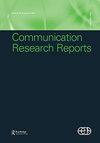How do people tweet about gay and bisexual people surrounding the 2022 monkeypox outbreak? An NLP-based text analysis of tweets in the U.S.
IF 1.9
Q2 COMMUNICATION
引用次数: 0
Abstract
ABSTRACTDespite the United States government agencies’ efforts, inconsistent messaging about the causes of the 2022 monkeypox outbreak in the U.S. facilitates the potential stigmatization of gay and bisexual communities. Grounded in the model of stigma communication, this research describes how Twitter users communicate about the monkeypox outbreak and sexual minorities by analyzing US-based tweets containing the following search strings: “gay,” “bisexual,” or “monkeypox.” Using natural language processing (i.e. n-gram and sentiment analyses), this study uncovered that among tweets mentioning “gay” or “bisexual” with “monkeypox” together, stigmatizing phrases such as “gay disease” and negatively valenced words were common. Results were discussed in terms of the model of stigma communication and the potential influences of such communication on Twitter to a broader society.KEYWORDS: Stigma communicationsexual minoritiesmonkeypoxTwittertext analysis Data availability statementData are available from the author.AcknowledgmentsThe author thanks Steve Rains for his feedback on an earlier version of this manuscript.Disclosure statementNo potential conflict of interest was reported by the author(s).Additional informationFundingThere are no relevant financial or non-financial competing interests to report.Notes on contributorsHyeonchang GimHyeonchang Gim (M.A., the University of Arizona, 2021) is a doctoral candidate in the Department of Communication at the University of Arizona. His research interests include mediated communication and intergroup relations.围绕2022年猴痘爆发,人们是如何发推特谈论同性恋和双性恋的?基于nlp的美国推文文本分析
尽管美国政府机构做出了努力,但关于2022年猴痘在美国爆发的原因的不一致的信息促进了对同性恋和双性恋群体的潜在污名化。该研究以污名传播模型为基础,通过分析美国的包含以下搜索字符串的推文:“同性恋”、“双性恋”或“猴痘”,描述了Twitter用户如何就猴痘疫情和性少数群体进行交流。利用自然语言处理(即n-gram和情感分析),这项研究发现,在将“同性恋”或“双性恋”与“猴痘”放在一起的推文中,“同性恋病”等污名化短语和负面评价词很常见。从污名化传播模型和Twitter上的这种传播对更广泛社会的潜在影响方面讨论了结果。关键词:病耻感传播性少数群体猴痘twitter文本分析数据可用性声明数据由作者提供作者感谢Steve Rains对本文早期版本的反馈。披露声明作者未报告潜在的利益冲突。其他信息资金没有相关的财务或非财务竞争利益需要报告。shyeonchang gimm(硕士,亚利桑那大学,2021年)是亚利桑那大学传播系的博士候选人。主要研究方向为媒介传播和群体间关系。
本文章由计算机程序翻译,如有差异,请以英文原文为准。
求助全文
约1分钟内获得全文
求助全文

 求助内容:
求助内容: 应助结果提醒方式:
应助结果提醒方式:


